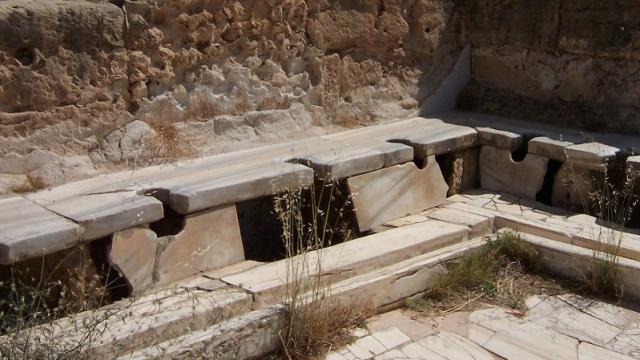Good plumbing is an overlooked, but vital, part of modern life. One of the first civilisations to really get a handle on it was the Romans. So why did the prevalence of parasites during Roman times increase compared to the Iron Age?
Research just published in the journal Parasitology indicates that Roman toilets and bath houses did not do anything to decrease the number of parasites feasting on Roman flesh. Piers Mitchell, of Cambridge’s Archaeology and Anthropology Department, reveals that Romans were plagued by mites and fleas, were stuffed full of roundworm and whipworm, routinely got dysentery after ingesting the protozoan Entamoeba histolytica, and generally had a miserable time — despite their celebrated plumbing.
How does he know this? It turns out that intestinal parasites are more durable than you might think. According to the paper, “The eggs of most intestinal helminths can be preserved for thousands of years in the right conditions, due to their tough chitinous walls. Human faeces in archaeological contexts can be recovered from latrine soil, coprolites (preserved pieces of human faeces) and the pelvic soil from burials, where the intestinal contents would have decomposed after death.” Amoeba remains can be detected by antibodies that react to them. Fleas, ticks and mites “can be detected by fine sieving of soil, and also looking for them on hair combs, mummies or ancient textiles.”
The Roman did have impressive water and sanitation systems. They also had decent laws meant to get sewage out of the cities and keep the water clean. So what went wrong?
Mitchell has several ideas about that, some of which have nothing to do with the toilets. For instance, the Romans loved a fermented fish sauce, called garum. It was an ancient way of making MSG, and added flavour to their food, but it also might have contributed to the number of Romans infected with fish tapeworm. The communal baths, though seemingly hygienic, could also have been breeding grounds for disease.
Mostly, though, it looks like Romans did exactly the wrong thing with all the sewage that they channelled out of their cities. They got it away from dense populations of people only to fertilise their food with it. Fertilisation with human faeces can be perfectly safe. If the faeces is composted for a long time, the parasites die off and the remaining nutrients boost crop yields.
However, there’s no indication that the Romans knew, or had laws to enforce, safe composting. Sanitation only works if you can make sure that the parasites are gone before any humans will come into contact with them again.
On the other hand, public toilets allowed Roman citizens to write things like, “Secundus defecated here“, on latrine walls — and a few parasites have to be worth that.
[Human parasites in the Roman World: health consequences of conquering an empire]
